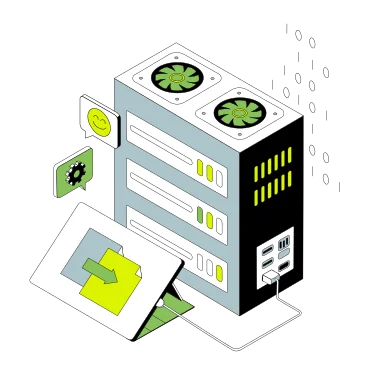Virtual Dedicated Server (VDS) is often overshadowed by its more prominent counterparts, Virtual Private Server (VPS) and Dedicated Server. This article aims to demystify VDS, providing insights into its functionalities, benefits, and how it contrasts with VPS and Dedicated Servers, helping businesses and individuals align their choices with their specific needs.
1. Virtual Dedicated Server (VDS)
A Virtual Dedicated Server is a type of server hosting that allocates dedicated resources to each user on a single physical server. It utilizes virtualization technology to create isolated, virtual servers, each with its dedicated RAM, CPU, and disk space. This ensures that users have exclusive access to their resources, experiencing enhanced performance and security compared to shared hosting.
2. Features and Benefits
Dedicated Resources
Unlike shared hosting, resources are not shared amongst users, ensuring optimal performance.


Enhanced Security
The isolated environments prevent any security breach from affecting other users on the same physical server.
Cost-Efficient
VDS provides the benefits of a dedicated server at a fraction of the cost.


Flexibility and Scalability
Users can easily scale resources based on their needs, and it supports various operating systems and applications.
3. VDS vs VPS
While VDS and VPS sound similar and both utilize virtualization technology, there are crucial differences between them.
| VDS | VPS | |
| Resource Allocation | Offers guaranteed resources, enhancing reliability and performance. | Resources are often oversold, leading to potential performance issues during peak times. |
| Performance | With dedicated resources, performance is consistent and superior. | Performance can fluctuate due to the sharing of resources among multiple users. |
| Customization and Control | Offers more control and customization options, akin to a dedicated server. | May have restrictions on customization and control due to shared hosting environments. |
4. VDS vs Dedicated Server
Distinguishing between VDS and Dedicated Servers primarily revolves around physical and virtual existence and resource allocation.
| VDS | Dedicated Server | |
| Physical vs Virtual | A virtual entity, created using virtualization technology on a physical server. | A physical server allocated to a single user, offering the highest level of performance and control. |
| Cost | More cost-effective due to the division of a single physical server into multiple virtual servers. | Typically more expensive as users rent an entire server and its resources. |
| Flexibility and Scalability | Offers high flexibility and easy scalability, allowing users to adjust resources based on their needs. | Requires more effort and time to scale resources, typically involving hardware changes. |
5. Why Choose VDS? Examples and Insights
When it comes to selecting the right hosting service, it often boils down to individual needs, budget constraints, and specific requirements of a website or an application. Let’s delve into practical scenarios to illustrate why one might opt for a Virtual Dedicated Server (VDS) over a Virtual Private Server (VPS) or a Dedicated Server.
Scenario 1: E-commerce Store with Seasonal Traffic Spikes
The Challenge: Maria runs an e-commerce store selling artisanal crafts. Her website sees significant traffic surges during the holiday season, but during off-peak times, it witnesses regular traffic.
The Solution: A VPS might not handle the holiday traffic surge efficiently if other sites on the same server also experience spikes, leading to slowdowns or even crashes. On the other hand, renting a dedicated server just for peak times might be overkill and costly. A VDS offers Maria the middle ground. She can have guaranteed resources during high-traffic periods and enjoy cost savings during off-peak times.
Scenario 2: Growing Blog with Plans for Expansion
The Challenge: Alex has a growing blog platform, anticipating more contributors and increased daily visitors in the coming months. He needs a solution that allows him flexibility and scalability.
The Solution: Opting for a dedicated server at this juncture might be premature and financially draining for Alex. A VPS might suffice initially, but as the blog grows, performance issues could arise. A VDS becomes an ideal choice. Alex can start with specific dedicated resources and scale up as the platform expands, ensuring seamless performance throughout.
Scenario 3: SaaS Startup with a Budget Constraint
The Challenge: Priya has developed a Software-as-a-Service (SaaS) application. As a bootstrapped startup, she’s cautious about monthly operational costs but doesn’t want to compromise on user experience.
The Solution: Renting a dedicated server might strain Priya’s budget. However, choosing a VPS, she risks performance drops if her application sees unexpected user spikes. VDS offers the solution. With dedicated resources ensuring top-notch performance and the cost benefits over a dedicated server, Priya can provide an uninterrupted user experience without overshooting her budget.
Scenario 4: Web Development Agency Hosting Client Sites
The Challenge: Jackson’s web development agency hosts multiple client websites. Each client demands excellent performance and uptime for their site, but their traffic and resource needs vary.
The Solution: Acquiring multiple dedicated servers for each client would be impractical. Using a shared or VPS solution could lead to inconsistent performance for client sites. With VDS, Jackson can allocate dedicated resources for each client on a per-need basis, ensuring every site runs smoothly and efficiently. It also simplifies scaling up resources for individual clients as their websites grow.
6. Discover Exceptional VDS Service!
Navigating through the myriad of Virtual Dedicated Server options can be overwhelming, each presenting seemingly unbeatable offerings. However, one provider has managed to outshine the rest with its exceptional performance, reliability, and value—all at a price that won’t break the bank.
7. Why Choose Our Recommended VDS Provider?
When choosing a VDS provider, you would naturally want to lean towards a service that offers the best value for your money, coupled with high-quality, reliable services. We have a VDS provider in mind that stands out with its exceptional offerings compared to some renowned names in the market.
8. Comparative Analysis:
| Provider | Specifications | Price/Month |
| [Our Recommended Provider] | 8 AMD EPYC™ Physical Cores, 32 GB RAM, 240 GB NVMe 32 TB | $68.99 |
| Linode | 8 CPUs, 16 GB RAM, 320 GB SSD 6 TB | $120.00 |
| DigitalOcean | 8 vCPUs, 16 GB RAM, 200 GB SSD 6 TB | $188.00 |
| Vultr | 8 vCPU, 32 GB RAM, 160 GB SSD 7 TB | $240.00 |
9. Exceptional Value
Our recommended provider offers a robust VDS plan for just $68.99/month, granting you 8 AMD EPYC™ Physical Cores, 32 GB RAM, 240 GB NVMe, and a whopping 32 TB of transfer, far exceeding the offerings of renowned competitors at a fraction of the price.
10. Superior Performance and Reliability
With high-quality, reliable services, and dedicated resources, the recommended VDS provider ensures optimal performance and uptime for your websites and applications, making it a prime choice for those who prioritize quality and reliability without breaking the bank.
11. Transparent Pricing
The prices are transparent, with no hidden fees, providing a clear and upfront understanding of what you are paying for, ensuring you get the best bang for your buck.
Conclusion
Navigating through the server hosting landscape, VDS emerges as a crucial player, strategically positioned between VPS and Dedicated Servers. It meticulously amalgamates the enhanced performance and dedicated resources of Dedicated Servers with the scalability and cost-efficiency of VPS, offering a balanced, flexible, and cost-effective solution, especially for those who desire dedicated resources without the hefty price tag of a full-fledged dedicated server.
Making an informed decision in this diverse landscape necessitates a careful consideration of various factors such as cost, specifications, and reliability. It is imperative for businesses and individuals to comprehend the distinct features and benefits of VDS to accurately assess their hosting needs and make judicious decisions. Whether the need is managing seasonal traffic spikes, ensuring consistent performance during organizational growth, accommodating a restrained budget, or presenting diversified hosting solutions to clients, a thorough exploration of VDS as a hosting option can potentially reveal the quintessential equilibrium between performance and value.
Our highlighted VDS provider exceptionally stands out in this competitive domain, delivering unparalleled services at an unbeatable price, making it a commendable choice for those aiming to find the optimal convergence of reliability, performance, and cost.
Frequently Asked Questions
A VDS is a hosting solution where virtualization technology is used to provide dedicated resources, such as RAM, CPU, and disk space, on a single physical server. It offers the benefits of dedicated resources with enhanced performance and security.
While both VDS and VPS use virtualization, VDS offers dedicated resources per user, leading to better performance and stability. Compared to dedicated servers, VDS is more cost-effective and scalable, providing a virtual solution with similar benefits but without the high cost of renting an entire physical server.
Businesses or individuals with specific performance, security, and resource requirements will find VDS appealing. It’s ideal for websites with fluctuating traffic, SaaS applications, growing blogs, or web development agencies hosting client sites.
Key benefits include dedicated resources for optimal performance, enhanced security through isolated environments, cost efficiency compared to full dedicated servers, and greater flexibility and scalability.
Yes, VDS is an excellent choice for handling seasonal traffic spikes due to its dedicated resources. Users can scale up resources during high-traffic periods and scale down during off-peak times, ensuring efficient performance and cost management.
VDS provides dedicated resources to each user, ensuring consistent and superior performance. The isolation from other users on the same physical server also enhances reliability and security.
VDS offers the advantages of dedicated hosting, such as dedicated resources and enhanced security, at a fraction of the cost of renting an entire physical server, making it a cost-efficient solution for those needing dedicated resources.
Yes, due to its dedicated resources, scalability, and cost efficiency, VDS is suitable for SaaS applications that require consistent performance and web development agencies that need to host multiple client sites with varying resource needs.
VDS allows users to easily scale their resources up or down based on their current needs. This flexibility ensures that users only pay for the resources they use, making it an efficient and adaptable hosting solution.
Consider factors such as the quality and reliability of the service, the cost and transparency of pricing, the specifications offered compared to competitors, and the provider’s reputation in the market.
